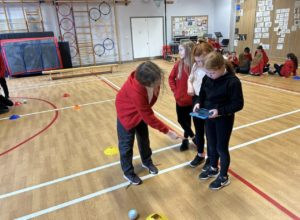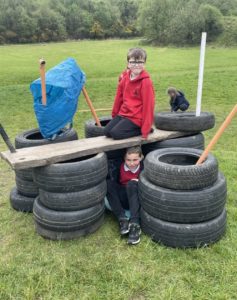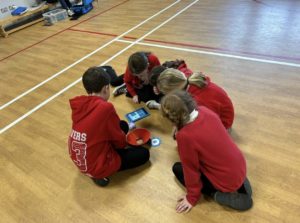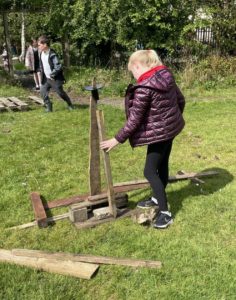STEM in Curriculum for Excellence
What is STEM?

As well as developing skills and knowledge in each individual subject, STEM related education and training aims to develop young people’s ability to work across disciplines through project-based learning.
These approaches enable young people to become familiar with the way STEM skills and knowledge are used in the world of work. In industry and workplace environments, individuals and teams with various expertise and skills would work together to generate new knowledge, ideas and products.
Why is it important?
The skills learned through STEM are valued by many employers including those in non-STEM related industries.
In Scotland there are many job opportunities for young people within STEM related industries.
STEM is key to all Scotland’s economic sectors:
- Creative industries
- Life sciences
- Energy
- Food and drink
- Financial and business
- Universities
- Tourism
What skills will my child develop?
STEM education and training seeks not only to develop expertise and capability in each individual field but also to develop the ability and skills to work across disciplines through interdisciplinary learning. Education and training in STEM helps acquire the following skills and capabilities:
- growing our understanding and appreciation of the natural and physical world
- the broader universe around us
- interpreting and analysing data and information
- research and critical enquiry – to develop and test ideas
- problem solving and risk assessment
- experimentation, exploration and discovery of new knowledge, ideas and products
- collaboration and working across fields and disciplines
- creativity and innovation – to develop new products and approaches
All of these are increasingly important to success in a changing and technologically driven world. They are also important for helping us to develop as active citizens, making informed decisions for ourselves and for society.
We recognise the importance of creativity and innovation for economic growth and the strong links that exist within STEM.
What will my child learn?
STEM learning can be experienced in a huge variety of exciting and inspiring ways. Children might be:
- outside making a den
- investigating the plants and trees to find useful materials
- measuring the height of trees or mapping their school grounds
- inspired by nature to write a song or poem
Learning in STEM often links to Learning for Sustainability and the Sustainable Development Goals. This helps learners to understand how STEM plays a vital role in finding solutions to real world issues or challenges such as protecting biodiversity, reducing marine plastic pollution and tackling climate change.
Schools take different approaches to STEM learning across the country:
- Schools may link with local industries to work on STEM in real working contexts.
- Project Based Learning approaches combine the individual disciplines within STEM to create a holistic learning experience for young people where there are opportunities to work in teams to solve problems or tackle STEM challenges.
Some schools have time allocated specifically to STEM on a weekly, fortnightly or termly basis. While in other schools, STEM may be embedded within the curriculum so you might be working on numeracy or mathematics but using STEM as a context for learning. An example of this would be calculating your average heart rate when exercising and afterwards, or drawing a graph of your investigation results.
How can I support my child’s learning?
Parentzone Scotland’s Supporting Science and Technologies at home section has simple ideas to support your child in learning about the sciences through everyday activities.
STEM and Equalities
Children receive and absorb gender stereotyped messages about what they can and cannot do as a girl or as a boy from a very early age.
The world around them and the representations they see inform and perpetuate these stereotypes.
Education Scotland is working with a wide range of partners to address and tackle stereotypes in relation to STEM. Practitioners, teachers and parents have an extremely important role to play in helping children and young people recognise that a broad range of opportunities are open to them and to reduce the external influence of bias or stereotypes.
Pathways in STEM
There are multiple pathways into a career in STEM including Apprenticeships, further and higher education. This means that a career in STEM is open to everyone!
As a parent, look out for new STEM pathways through Foundation Apprenticeships. There are also a number of frameworks for Foundation Apprenticeships which are STEM-based including:
- Accountancy
- Civil Engineering
- Creative and Digital Media
- Engineering
- Food and Drink Technologies
- Scientific Technologies
- Software Development
Foundation Apprenticeships are open to senior phase pupils.
Find out more on the Developing the Young Workforce section of this site.
Careers in STEM
Scotland offers many exciting and rewarding careers in STEM, as do other countries around the world. STEM is vital for many of Scotland’s key economic sectors: such as energy, the creative industries (including digital), food and drink and life sciences.
It is often thought that these careers are only available to those who have a university degree in a STEM related subject, but many opportunities also exist for modern apprentices and for technician-level roles too.
The skills gained through STEM can also open doors to careers in many other sectors. For instance, transferable skills such as the ability to solve problems, make accurate predictions and draw valid conclusions are useful in many different jobs.
As a result, STEM skills are valued by employers in both STEM and non-STEM sectors.
Skills Development Scotland (SDS) have compiled data on the current and future skills demand in each region of Scotland. They have made infographics which can tell you more about where you live. Go to Skills Development Scotland Local and National Work, use the drop-down menu to search for where you live and look for the Regional Skills Assessment (RSAs) Infographic.
Find out more about Skills with this handy guide (Skills in a Nutshell)




